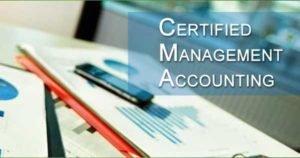Looking to enhance your accounting skills and open doors to global opportunities? Look no further than the US Certified Management Accountant (CMA) certification. US CMA offers prestigious international recognition.
Whether you are a seasoned professional or just starting your accounting journey. The US CMA offers a comprehensive and prestigious qualification. It sets you apart in the competitive job market.
What is US CMA Certification?
The US CMA course is a professional certification that focuses on management accounting and financial management. It is offered by the Institute of Management Accountants (IMA). This course is highly regarded in the industry.
It provides a competitive edge if you’re looking to advance your career in accounting. The US CMA course covers many topics, including financial planning and analysis. It also includes risk management, investment decisions, and professional ethics.
The CMA USA course fees vary depending on the study materials and exam registration fees. It is important to research and compare different options. To find the most suitable and affordable course fees for your budget.
The US CMA focuses on strategic planning, financial management and business analysis skills. It is globally recognised and can open doors to career opportunities in finance and accounting.
The CMA USA course fees vary depending on the provider and location. But it is an investment worth considering if you’re looking to advance your career in the field of management accounting.
Here, we will explore the benefits of the US CMA certification and CMA USA course fees. We will understand the value it adds to your career. And how you can embark on this transformative journey.
Get ready to unlock your accounting success with the US CMA course.
Advantages of enrolling in US CMA
Enrolling in the US CMA programme has several advantages:
- It is a globally recognised certification. This enhances your career prospects and opens up new job opportunities. You can take up jobs both within the US and internationally.
- The US CMA programme provides in-depth knowledge and skills in management accounting. It also includes financial planning, analysis, control and decision support. These are highly valued by employers.
- The US CMA designation demonstrates your commitment to professional excellence and ongoing learning.
- It can increase your credibility and earning potential. The CMA USA course fees are a great investment, considering the opportunities it brings along.
- It offers flexibility in terms of study options and schedules, allowing you to balance your professional and personal commitments.
Career opportunities after completing US CMA
After completing the US CMA course, you will have many career opportunities. Some common job titles for US CMA graduates include financial analyst, management accountant, internal auditor and financial controller.
These roles can be found in various industries such as banking, consulting, manufacturing and healthcare. The US CMA certification is highly respected and recognised globally.
It can open doors to international career opportunities as well. Thus, the CMA USA course fees are a good investment.
Enrol today in the US CMA course
The US CMA course fees vary depending on the institute and the study materials chosen. The average CMA USA course fees range from 1 to 1.5 lakhs.
It is important to remember that investing in a high-quality course can lead to great career opportunities and higher earning potential.
The US CMA course provides in-depth knowledge and skills in management accounting and financial management, which are highly valued in the business world.
Completing this course can open doors to lucrative career options and help you stand out in the job market. So, if you’re considering a career in finance or accounting, the US CMA course is worth the investment.
Enrol today in the US CMA course at Imarticus Learning, a leading platform for accessing learning programmes for young professionals.
Our comprehensive course is designed to help you excel in the field of management accounting. It opens up new career opportunities. The programme has lower CMA USA course fees. With expert faculty, interactive learning materials and practical case studies, you’ll gain the knowledge and skills needed to become a certified management accountant.
Don’t miss out on this valuable opportunity to enhance your professional growth. Visit Imarticus Learning today and take the first step towards a successful career!





